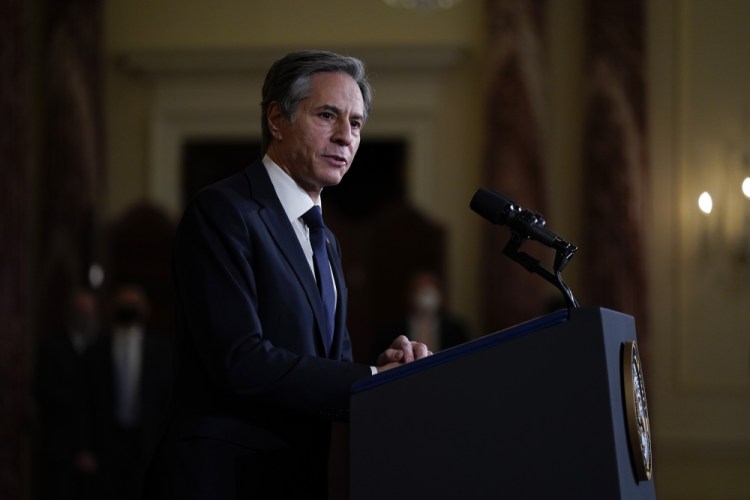WASHINGTON — President Biden instructed the State Department on Monday to re-engage with the United Nations Human Rights Council, reversing a decision by the Trump administration to withdraw from it nearly three years ago due to frustrations that the council repeatedly criticized Israel.
In explaining the decision, Secretary of State Antony Blinken said Trump’s withdrawal from the U.N. body in June of 2018 “did nothing to encourage meaningful change, but instead created a vacuum of U.S. leadership, which countries with authoritarian agendas have used to their advantage.”
“When it works well, the Human Rights Council shines a spotlight on countries with the worst human rights records and can serve as an important forum for those fighting injustice and tyranny,” Blinken said in a statement Monday.
The decision fulfills a promise Biden made during his presidential campaign to rejoin the council and return U.S. influence to important international institutions that the Trump administration ceded to other major powers.
The move is expected to face criticism from Republican lawmakers and pro-Israel activists who have long complained that the council disproportionately criticizes the Jewish state’s occupation of Palestinian territory in comparison to human rights issues in other countries.
“If Biden rejoins the council whose membership includes dictatorial regimes & some of the world’s worst human rights violators, it will fly in the face of our fight for human rights,” former Trump administration ambassador to the U.N. Nikki Haley tweeted last month.
Haley and other critics hoped that withdrawing from the body would delegitimize its criticisms of Israel.
Human rights organizations and liberal groups have argued that by pulling out, the United States relinquished its influence over a host of global issues at the expense of just one issue seized on by politically influential pressure groups.
“The Human Rights Council gets a lot of flak, but it plays an important if sometimes tragic role tracking abuses in countries like Syria and Venezuela,” said Richard Gowan, U.N. director at the International Crisis Group. “At a time when big power politics is snarling up the Security Council, the Human Rights Council offers the U.S. another platform to spotlight how nasty regimes are mistreating their citizens. Its immediate impact can be limited, but it is an important accountability mechanism.”
The Trump move also left the United States more exposed to criticism of its own internal actions. Following the May killing of George Floyd, a 46-year-old black man in Minneapolis, a number of African states came close to forcing through an unprecedented Human Rights Council resolution that demanded an investigation of racism in the United States. The countries ended up settling for a broader study of systemic racism after strenuous U.S. pushback, but the affair suggested a weakened U.S. hand after it left the council, the first time any country had left the body voluntarily.
Members of the council are elected for three-year terms and can’t serve consecutively for more than two terms. Trump withdrew from the body when the United States was halfway through its term. The U.N. General Assembly is set to elect new members later this year.
It is unclear if the United States will run for full membership this year – an effort that may face resistance from China, which won a seat despite a campaign by the United States to stop it last year.
In a preview of the Biden administration’s priorities for the council, Blinken said the body can ” help to promote fundamental freedoms around the globe, including freedoms of expression, association and assembly, and religion or belief as well as the fundamental rights of women, girls, LGBTQI+ persons, and other marginalized communities.”
Blinken said the council was in need of reform, “including its disproportionate focus on Israel,” but said that “to address the Council’s deficiencies and ensure it lives up to its mandate, the United States must be at the table using the full weight of our diplomatic leadership.”
Send questions/comments to the editors.



Success. Please wait for the page to reload. If the page does not reload within 5 seconds, please refresh the page.
Enter your email and password to access comments.
Hi, to comment on stories you must . This profile is in addition to your subscription and website login.
Already have a commenting profile? .
Invalid username/password.
Please check your email to confirm and complete your registration.
Only subscribers are eligible to post comments. Please subscribe or login first for digital access. Here’s why.
Use the form below to reset your password. When you've submitted your account email, we will send an email with a reset code.